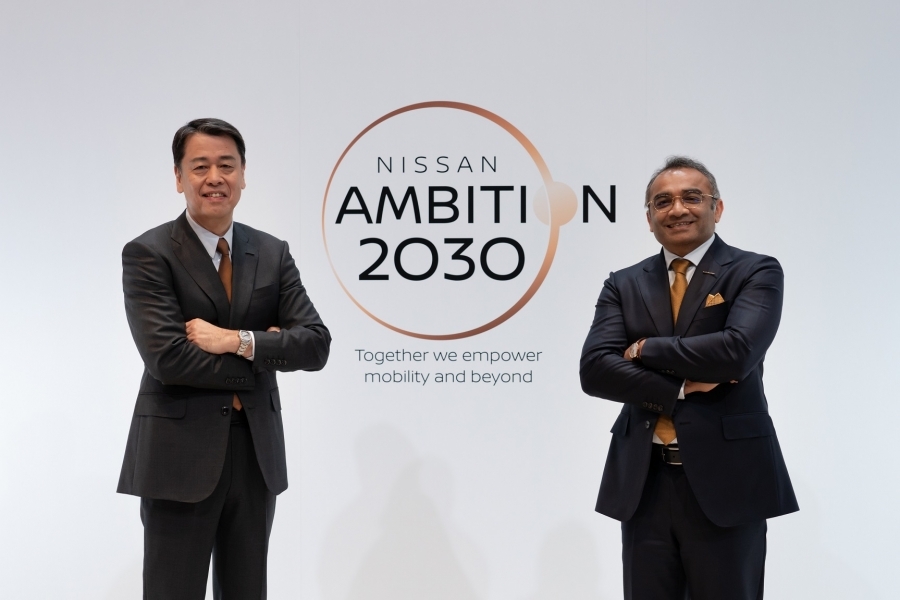With this vision, Nissan brings strategic value by empowering journeys, offering safe, exciting and more integrated experiences, and through partnerships, preparing society to build an intelligent ecosystem with integrated mobility.
In the next ten years, Nissan will offer exciting electrified vehicles and technological innovations, while expanding its operations globally. This vision supports Nissan's goal of achieving carbon neutrality across the entire lifecycle of its products by fiscal 2050.
Nissan CEO Makoto Uchida commented, "The role of business in responding to society's needs is increasingly important. With Nissan Ambition 2030, we will drive the new era of electrification, advance technologies to reduce carbon footprint and pursue new business opportunities. We want to transform Nissan to become a sustainable company that is truly needed by customers and society".
Accelerating electrified mobility with diverse options and experiences.
As an electric vehicle (EV) pioneer, Nissan has democratized EVs and invested in the creation of charging infrastructure and energy management. By placing electrification at the center of the company's long-term strategy, Nissan Ambition 2030, the company aims to accelerate the electrification of its vehicle lineup and the pace of technological innovation with investments of 2 billion yen over the next five years.
Based on customer demand for a diverse range of exciting vehicles, Nissan will introduce 23 new electrified models, including 15 new electric vehicles by fiscal 2030, aiming to achieve an electrification mix of more than 50% globally across all Nissan and INFINITI brands.
With the introduction of 20 new EV- and e-POWER-equipped models over the next five years, Nissan aims to increase its electrification sales mix in major markets by fiscal 2026, including:
- Europe, with more than 75% of sales
- Japan, with more than 55% of sales
- China, with more than 40% of sales
- The United States at 40% of electric vehicle sales by fiscal 2030
"We are proud of our long history of innovation and our role in the electric vehicle revolution. With our new ambition, we continue to lead the acceleration of the natural shift to electric vehicles, creating a compelling customer proposition, driving excitement, enabling adoption and creating a cleaner world", said Ashwani Gupta, Chief Operating Officer, Nissan.
Representing the next stage of Nissan's electrified future, the company today also unveiled four new concept vehicles that offer enhanced experiences through a sophisticated technology package through a sophisticated technology package. These concepts showcase the exciting possibilities Nissan is striving to deliver in a wide range of new vehicles and advanced ecosystems.
Nissan Chill-out is a next-generation concept crossover and an innovative way of thinking about mobility. It uses the CMF-EV platform, which offers high levels of comfort and an energizing driving experience and e-4ORCE technology which is a four-wheel control system that achieves precise, stable, comfortable and sporty handling.
Nissan Max-Out is a convertible concept that focuses on delivering a new driving experience with its superlative stability and comfort, Ultra-lightweight, very low center of gravity and advanced e-4ORCE technology.
Nissan Surf-Out aims to provide a smooth ride regardless of terrain, allowing customers to go anywhere in comfort and confidence. Off-road performance, extended cargo space and advanced e-4ORCE technology.
Nissan Hang-Out has been developed to overcome the conventional view of vehicle interior layout. It has a low, flat floor, comfortable quiet cabin, advanced e-4ORCE and advanced ProPILOT which is a practical driver assistance system that combines Nissan's Intelligent Cruise Control and Steering Assist technologies and includes a stop-start function that can bring the vehicle to a complete stop, hold it in place and can re-accelerate when traffic starts moving again.
Increasing accessibility and mobility innovation
Nissan's ambition is to support greater access to safe and exciting mobility. To achieve this, Nissan will continue to evolve its lithium-ion battery technologies and introduce cobalt-free technology to reduce cost by 65% by fiscal 2028.
Nissan aims to launch an electric vehicle with its own all-solid-state batteries (ASSB) by fiscal 2028 and prepare a pilot plant in Yokohama by fiscal 2024. With the introduction of the innovative ASSB, Nissan will be able to expand its electric vehicle offerings across all segments and deliver more dynamic performance. By reducing charging time to one-third, the ASSB will make electric vehicles more efficient and affordable.
In addition, Nissan expects the ASSB to reduce the cost of battery packs to $75 per kWh by fiscal 2028 and aims to reduce it further, to $65 per kWh, to achieve cost parity between electric and gasoline vehicles in the future.
Nissan aims to establish a global battery supply system to meet growing customer demand for vehicles and support the increasing number of electric vehicles in use. In collaboration with its partners, Nissan plans to increase its global battery production capacity to 52 GWh by fiscal 2026, and to 130 GWh by fiscal 2030.
Through Nissan Ambition 2030, the company seeks to extend the benefits of mobility by offering its advanced driver assistance and intelligence technologies to more customers.
These combined efforts will also support Nissan's ongoing efforts to establish new mobility services and partnerships.
The brand intends to expand ProPILOT technology to more than 2.5 million Nissan and INFINITI vehicles by fiscal year 2026. The company will also continue to develop its autonomous vehicle technologies, with the goal of incorporating next-generation LIDAR systems in virtually all new models by fiscal 2030.
To meet the different transportation needs of different countries, Nissan will collaborate with the most appropriate partners to realize new services that enable more efficient mobility in cities, as well as more sustainable mobility in rural areas.
Global ecosystem for mobility and beyond
In addition to technological improvement, Nissan will expand local manufacturing and sourcing to make electric vehicles more competitive. Nissan will expand its unique electric vehicle hub concept such as EV36Zero, which was launched in the United Kingdom, to major markets such as Japan, China and the United States. EV36Zero is a fully integrated manufacturing and services ecosystem that connects mobility and energy management with the goal of achieving carbon neutrality.
Ensuring that vehicle batteries remain sustainable will continue to be a priority for Nissan, building on its decade of reuse and recycling expertise with 4R Energy. The company aims to expand its battery reconditioning facilities beyond Japan with new locations in Europe in fiscal 2022, and in the United States in fiscal 2025.
Nissan's reconditioning infrastructure will support a circular economy in energy management, and the company aims to fully commercialize its battery systems for vehicles and homes by the mid-2020s. The company will also invest up to 20 billion yen by 2026 in charging infrastructure.
As Nissan increases its pace of mobility innovation, it intends to hire more than 3,000 research and development employees globally, while continuing to upgrade its existing workforce. The company will in parallel build on collaboration with the Alliance to enable cost efficiencies and shared expertise in areas such as carbon-neutral technologies, electrification, software and services.
Beyond the Nissan NEXT transformation plan, the company will maintain its long-term business, with a consolidated operating margin above 5%.
 English
English  Español
Español 

